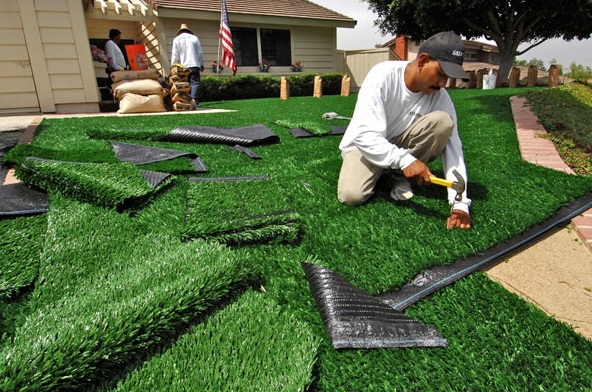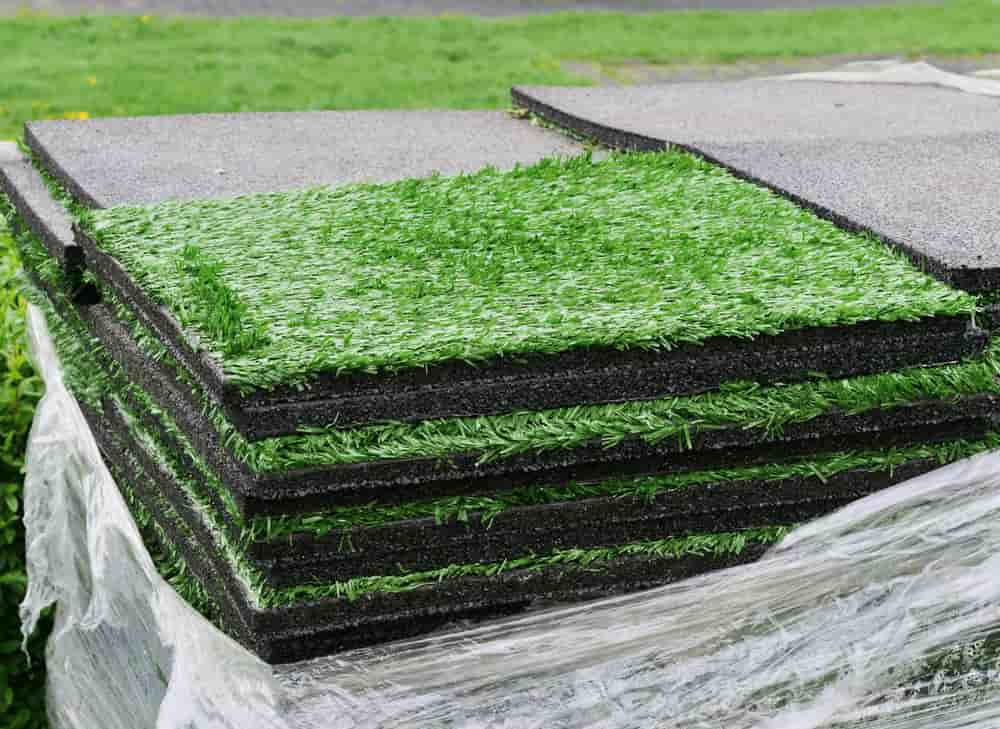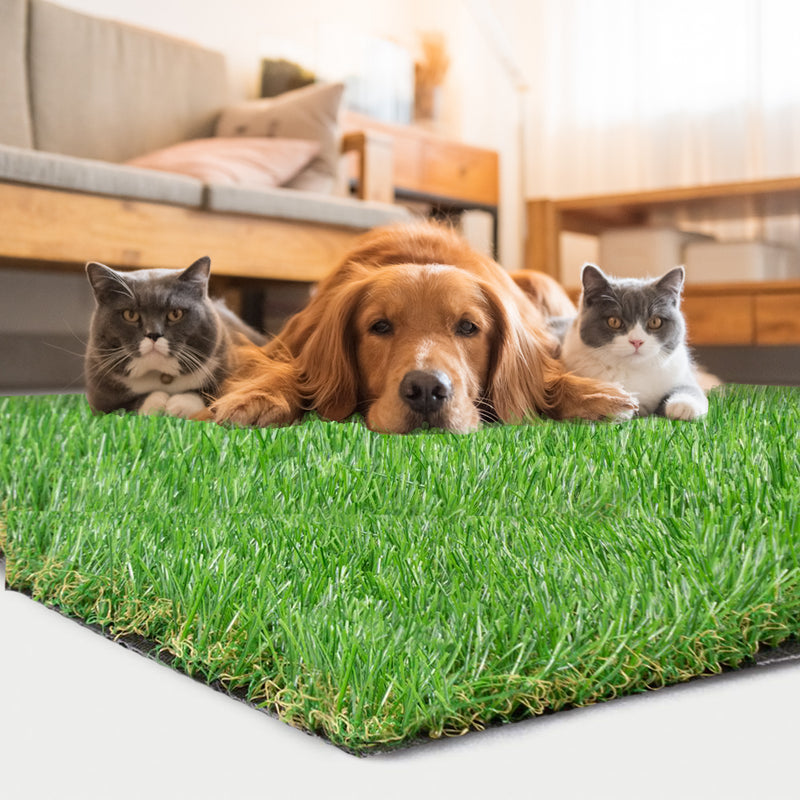Explore the Environmental Benefits of Opting for Artificial Lawn Solutions
The fostering of man-made grass remedies provides an engaging possibility to deal with pressing ecological difficulties. By considerably lowering water usage and lessening the application of dangerous chemicals, these choices not only promote lasting landscape design however additionally shield neighborhood environments. Additionally, the reduced carbon footprint related to decreased upkeep tasks adds to an extra sustainable technique to land administration. The ramifications of these advantages prolong past simple conservation efforts, elevating concerns concerning their long-term effect on habitat preservation and overall eco-friendly equilibrium. Discovering these measurements discloses an intricate interaction worth thinking about.
Water Preservation Perks
Among one of the most considerable benefits of synthetic lawn is its capability to preserve water. Standard yard lawns call for considerable irrigation, particularly in locations susceptible to dry spell or water restrictions. In comparison, fabricated lawn does not need watering, substantially reducing the general need for water sources. This attribute is particularly advantageous in deserts where water shortage is a pushing worry.
By getting rid of the need for routine watering, synthetic grass contributes to lasting landscape methods and helps alleviate the ecological effect of extreme water intake. Furthermore, the preservation of water reaches the reduction of overflow, which can lead to soil disintegration and waterway air pollution.
Furthermore, the setup of fabricated grass permits districts and home owners to allocate water resources more successfully, concentrating on necessary uses such as drinking water and agriculture. The change towards synthetic grass not just advertises liable water use but also straightens with more comprehensive ecological goals focused on preserving natural deposits.
As areas increasingly focus on sustainability, the water preservation advantages of artificial lawn present an engaging situation for its fostering in industrial and domestic landscape design jobs.
Reduced Chemical Use
The change to fabricated turf substantially reduces the reliance on chemical treatments commonly utilized in all-natural turf maintenance. Typical grass monitoring commonly entails the application of herbicides, plant foods, and chemicals to advertise development and control parasites. These chemicals can position risks to human wellness, local wild animals, and the setting, adding to soil and water contamination.
In comparison, artificial turf removes the need for these hazardous compounds. By lessening the launch of synthetic substances into the community, synthetic grass advertises much healthier dirt and water systems.
Moreover, the absence of chemical overflow related to synthetic grass installments helps safeguard neighborhood waterways from contamination, supporting aquatic life and maintaining biodiversity. Phoenix turf companies. As neighborhoods progressively prioritize lasting methods, choosing synthetic grass offers a feasible service that straightens with environmental conservation goals. Through this change, residential property owners can appreciate lush eco-friendly rooms without endangering eco-friendly wellness, leading the way for an extra sustainable future
Lower Carbon Footprint

Furthermore, the installment of synthetic lawn can cause considerable water conservation. All-natural lawns require substantial amounts of water for watering, which not just includes in the carbon impact connected with water removal and treatment yet likewise pressures neighborhood water sources. In contrast, synthetic grass needs marginal maintenance, requiring no watering, thus considerably reducing water usage and its connected power expenses.
Furthermore, the longevity of synthetic grass contributes to its decreased carbon impact. With a life expectancy of up to 15 years or more, the demand for regular replacements is lessened, resulting in less waste and reduced power usage in manufacturing and disposing of conventional grass choices. Generally, man-made turf offers a lasting alternative for ecologically aware landscaping.
Environment Preservation
Environment conservation is a vital consideration in the dispute over landscape design options, especially when contrasting synthetic grass to natural yard. All-natural grass yards usually require extensive upkeep, including making use of plant foods, herbicides, and pesticides, which can adversely influence local environments. These chemicals can leach into the dirt and waterways, hurting native flora and animals and interrupting regional habitats.
In comparison, fabricated lawn presents a chance to minimize the eco-friendly impact of landscape design. By choosing synthetic grass, homeowners can decrease the interruption of all-natural environments connected with conventional yard treatment practices. Synthetic grass gets rid of the need for unsafe chemicals, thus securing close-by wild animals and preserving the integrity of surrounding ecological communities. The installation of man-made turf can lead to the conversion of former yard areas right into more biodiverse landscapes, such as pollinator gardens or native plant areas, which can support regional wild animals.
Ultimately, the transition to synthetic grass not only preserves water and reduces upkeep initiatives yet additionally cultivates a much more unified relationship between human activities and the natural environment, promoting habitat conservation in the check that procedure.
Long-Term Sustainability
Long-lasting sustainability is an important factor in evaluating the benefits of artificial turf over standard lawn lawns. Among Your Domain Name the most significant benefits of synthetic grass is its durability; it can last approximately 15-20 years with minimal maintenance, whereas all-natural turf needs regular reseeding and replacement. This long life lowers the requirement for consistent resources, such as water, plant foods, and pesticides, which are important for keeping a healthy grass yard.
Furthermore, synthetic grass adds to a decrease in carbon emissions connected with grass treatment devices. Typical lawns frequently need gas-powered mowers, leaners, and blowers, all of which add to air contamination. Artificial turf companies phoenix. In contrast, artificial turf gets rid of the need for such tools, advertising a cleaner atmosphere
Furthermore, the production of synthetic grass increasingly makes use of recycled products, enhancing its sustainability profile. As producers adopt eco-friendly practices, the ecological impact of synthetic grass continues to diminish.

Final Thought
The fostering of important site synthetic grass options presents significant ecological advantages, consisting of substantial water preservation, decreased reliance on damaging chemicals, and a lower carbon impact. Additionally, synthetic grass aids in maintaining natural habitats by minimizing land disturbance and advertising long-lasting sustainability through the usage of long lasting materials. Jointly, these aspects underscore the possibility of synthetic grass to contribute positively to ecological wellness and provide a sensible option to standard landscaping techniques in a significantly resource-conscious world.
In contrast, fabricated lawn does not need watering, substantially decreasing the general need for water resources. By minimizing the launch of synthetic substances into the community, fabricated lawn promotes healthier dirt and water systems.
Moreover, the installation of man-made turf can result in considerable water preservation. In comparison, synthetic grass requires very little upkeep, calling for no watering, thereby dramatically reducing water use and its associated energy prices.
